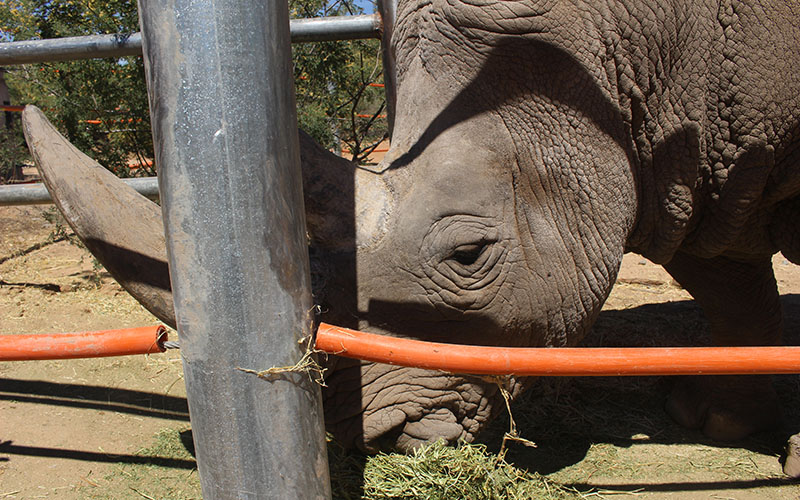CAMP VERDE – The “growth” industry has fueled Arizona’s economy – growth in houses, offices, and places to have fun. Consistent growth is possible, in part, because of prudent water management in the more populated areas of the state. But outside the population hubs, some water rights still are tied up in court, making it hard for developers to plan.
At the exotic animal park Out of Africa, visitors can marvel at a menagerie that includes a rhino named Jericho, a king cobra and a bevy of wild cats. The marquee attraction at the park is the Tiger Splash, where staff play with tigers around a swimming pool, trying to coax them into the water.
The park gets 150,000 to 200,000 visitors each year, co-owner Bill Jump said. It would like a lot more.
Out of Africa wants to add a hotel, a conference center and, possibly, a water park. For the water park in particular, investors would want assurances the site has a defined water source and buy-in from the community. But at the moment, Jump said, a long-term water plan for something so substantial as a water park isn’t likely.
“Right now, we’re at the risk of a long-term solution being the courts,” he said. “Coming in and making a maybe irrational decision as to how they’re going to allocate water for the whole state.”
In 1980, Arizona designated five Active Management Areas – Prescott, Phoenix, Pinal, Tucson and Santa Cruz – that are heavily reliant on the mining of groundwater. Each AMA pursues a goal of stabilizing water tables under the Arizona Groundwater Code.
Outside of the AMAs, however, water rights often are tied up in the court system. As a result, tens of thousands of users don’t have complete certainty of their rights to a portion of certain key rivers, including the Gila and Little Colorado. A judge in Maricopa County Superior Court is overseeing a lawsuit called the Gila River General Adjudication. Through the adjudication process, the judge will decide on claims to water from several Arizona rivers – or water pumped from wells close to the rivers.
The case has dragged on since in the 1970s.
“We think we’re at the point where the adjudication is beginning to impact the ability of these communities to grow in the way they aspire to, and also to sustainably manage water,” said Sarah Porter, director of the Kyl Center for Water Policy at Arizona State University.
Tens of thousands of users don’t have complete certainty of their rights to a portion of certain key rivers.
Porter recently surveyed a few dozen developers and corporate-site selectors for the report The Price of Uncertainty, which found concerns about water are growing. She also found that uncertainty about water often immediately disqualifies a site from consideration for investment.
“They don’t bother with places where there’s uncertainty about water rights,” she said.
Steve Ayres, economic development director for Camp Verde, said a better solution than a court decree would be for the various claimants to make their own deal, creating a system where water rights can be bought, sold or leased.
“So when the adjudication court comes here, those parties won’t be objecting to one another’s use. They’ll actually have a deal worked out,” he said. “The court would be foolish not to accept a resolution that is acceptable to both parties.”
And there are some glimmers of this kind of solution. Out of Africa, for instance, is paying another company to use less water through a local water-credit program called the Verde River Exchange. That way, the park can offset the 815,000 gallons it uses in Tiger Splash and an otter habitat.
ASU’s Porter thinks local programs like the exchange are promising, but she notes there are more than 50,000 water-rights claims in the Gila River watershed, which includes the Verde and San Pedro rivers.
“To actually make a settlement work, you have to get enough parties to agree to the settlement. That means compromise on all sides.”
She added a settlement could require state legislation, and there already are other water issues that need the Legislature’s attention.
Ayres suspects some water users don’t want the adjudication completed because they’ll be told to stop pumping water to which they’re not entitled. So if a settlement doesn’t happen, water users will have to wait – as they have for decades.
“Is it ever going to get adjudicated? I don’t know,” Ayers said. “I’m 63. I doubt seriously it’ll happen in my lifetime.”
This story is part of Elemental: Covering Sustainability, a new multimedia collaboration between Cronkite News, Arizona PBS, KJZZ, KPCC, Rocky Mountain PBS and PBS SoCal.
Subscribe to the Cronkite News podcast In Focus on iTunes.
